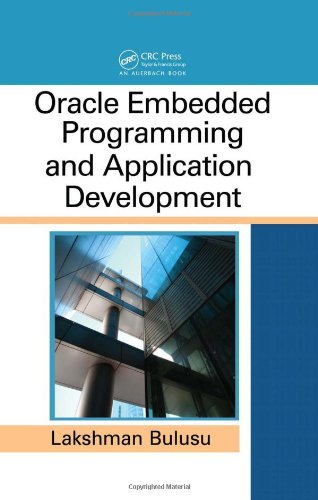

Most ebook files are in PDF format, so you can easily read them using various software such as Foxit Reader or directly on the Google Chrome browser.
Some ebook files are released by publishers in other formats such as .awz, .mobi, .epub, .fb2, etc. You may need to install specific software to read these formats on mobile/PC, such as Calibre.
Please read the tutorial at this link. https://ebooknice.com/page/post?id=faq
We offer FREE conversion to the popular formats you request; however, this may take some time. Therefore, right after payment, please email us, and we will try to provide the service as quickly as possible.
For some exceptional file formats or broken links (if any), please refrain from opening any disputes. Instead, email us first, and we will try to assist within a maximum of 6 hours.
EbookNice Team

Status:
Available4.5
15 reviewsFocusing on tried and true best practice techniques in cross-technology based Oracle embedded programming, this book provides authoritative guidance for improving your code compilation and execution. Geared towards IT professionals developing Oracle-based Web-enabled applications in PL/SQL, Java, C, C++, .NET, Perl, and PHP, it covers application development from concepts to customization, following a pragmatic approach to design, coding, testing, deployment, and customization—explaining how to maximize embedded programming practices.
Oracle Embedded Programming and Application Development explains application development frameworks using 3GL and 4GL high-level language code as embedded code segments across .NET, Java, and Open Source technologies, in conjunction with SQL and/or PL/SQL and the Oracle RDBMS through version 11gR2. It also:
This practical guide details techniques for constructing architecture and code design methodologies for live application development projects that can be generalized and standardized as application development and code design frameworks. Cover to cover, the text provides an understanding of how the designed, developed, and deployed solutions conform to emerging and next-generation trends. It also discusses the conformance and usage of Web 2.0-based RIA functionality and regulatory compliance practices involving auditing and security.
Praise for:
"Taking an Oracle-centric approach, Lakshman skillfully guides you through the maze of various popular programming languages and environments including .NET, C/C++, Perl, PHP, Java, and even SQL and PL/SQL – not only showing you how they interact with Oracle but also which language is the best fit for a given situation." —John Kanagaraj, Executive Editor, IOUG SELECT Journal